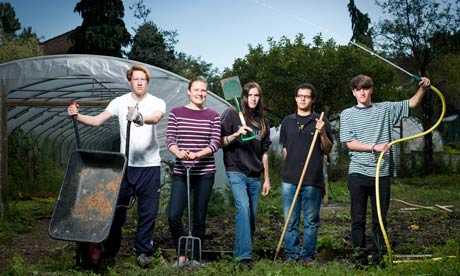
My brain is having trouble connecting two disparate things: bags stuffed full of the most vibrant chillis and the fact they were grown in a disused car park in Brentford, west London. These hot balls of bright yellow and vivid orange, among the hottest in the world, according to Sean Connor, grower at Cultivate London, are now on their way, via train, to Chilli Pepper Pete's in Brighton, happily fulfilling a weekly order at £18 per kilo.
Cultivate London is a social enterprise that gives equal billing to growing food and providing job opportunities for young west Londoners. It began in March 2011, with a £250,000 grant from Pathways, a not-for-profit organisation that backs projects which enrich local communities. Cultivate is becoming renowned for its variety of produce, from edible plants in pots to a sophisticated selection of salad leaves, including mizuna and red giant mustard. It helps that urban farming is becoming mainstream, and that they have a dedicated salesperson, but word of mouth has also been key. And not just from customers of the farmers' markets and delis that sell their produce. The most powerful advocates of all are Cultivate's young trainees.
"I'm always looking for opportunities to get our produce sold somewhere," says the 21-year-old Connor, who started here as a volunteer in March 2011, after the job centre had failed to yield much in the way of work. He is now growing full time. "I can't stop going into restaurants and trying to persuade them to take our stuff. Generally it seems to work: they love the idea that we grow so locally."
This year Cultivate will take on 30 volunteers to work alongside its six full-time staff. It's notable that the younger trainees are all ambitious about their produce. This is not just stuffing seeds in pots and hoping for the best. A white aubergine plant bearing its first fruit is presented by way of evidence. "This is my pride and joy," says head grower Ben Simpkins.
But change is on the way – an £18m development will annexe Cultivate's car park. So on 1 November the entire project will move 800 metres to the left, to another patch of unloved land. "Some land is better than no land," a trainee says sagely. It's a reminder of the resilience needed to be a peripatetic urban farmer. cultivatelondon.org

